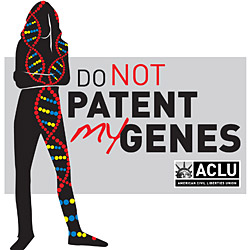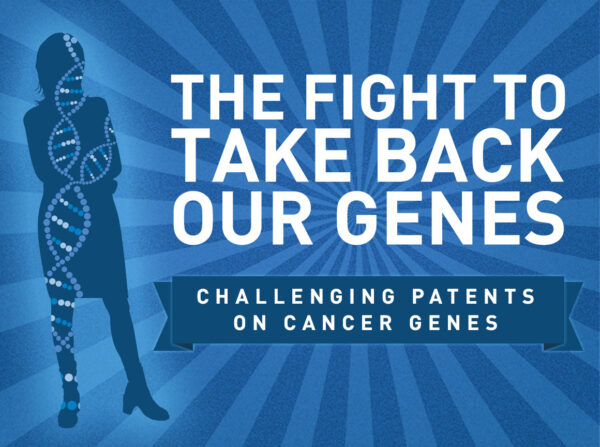ACLU and PUBPAT Argue Today That Patents on Breast Cancer Genes Are Unconstitutional and Invalid

First Hearing In Federal Court About The Patentability Of Human Genes
FOR IMMEDIATE RELEASE
CONTACT: (212) 549-2666; media@aclu.org
NEW YORK – In the first hearing in federal court about the patentability of human genes, the American Civil Liberties Union and the Public Patent Foundation (PUBPAT), a not-for-profit organization affiliated with Benjamin N. Cardozo School of Law, asked the court today to rule that patents on two human genes associated with breast and ovarian cancer are unconstitutional and invalid. The groups charge that the patents stifle diagnostic testing and research that could lead to cures and that they limit women's options regarding their medical care.
"Allowing patents on genetic material imposes real and severe limits on scientific research, learning and the free flow of information," said Chris Hansen, an attorney with the ACLU.
The lawsuit, Association for Molecular Pathology, et al. v. U.S. Patent and Trademark Office, et al., was filed on May 12, 2009 in the U.S. District Court for the Southern District of New York on behalf of breast cancer and women's health groups, individual women and scientific associations representing approximately 150,000 researchers, pathologists and laboratory professionals. The lawsuit was filed against the U.S. Patent and Trademark Office, as well as Myriad Genetics and the University of Utah Research Foundation, which hold the patents on the genes, BRCA1 and BRCA2. The lawsuit charges that patents on human genes violate the First Amendment and patent law because genes are "products of nature" and therefore can't be patented.
"Patenting human genes is like patenting e=mc2, blood or air," said Hansen.
"The patent system was designed to reward and encourage human ingenuity. But genes are naturally-occurring parts of our bodies, not inventions," said Daniel B. Ravicher, Executive Director of PUBPAT and co-counsel in the lawsuit. "Patents on human genes should never have been granted in the first place. Genes are identified, not invented."
Mutations along the BRCA genes are responsible for most cases of hereditary breast and ovarian cancers. Many women with a history of breast and ovarian cancer in their families opt to undergo genetic testing to determine if they have the mutations on their BRCA genes that put them at increased risk for these diseases. This information is critical in helping these women decide on a plan of treatment or prevention, including increased surveillance or preventive mastectomies or ovary removal.
The patents granted to Myriad give the company the exclusive right to perform diagnostic tests on the BRCA1 and BRCA2 genes and to prevent any researcher from even looking at the genes without first getting permission from Myriad. Myriad's monopoly on the BRCA genes makes it impossible for women to access alternate tests or get a second opinion about their results and allows Myriad to charge a high rate for their tests.
Because the ACLU's lawsuit challenges the whole notion of gene patenting, its outcome could have far reaching effects beyond the patents on the BRCA genes. Approximately 20 percent of all human genes are patented, including genes associated with Alzheimer's disease, muscular dystrophy, colon cancer, asthma and many other illnesses.
"The patents on the BRCA genes restrict women's access to genetic testing and interfere with their medical care," said Sandra Park, staff attorney with the ACLU Women's Rights Project. "We hope that at the conclusion of this lawsuit, the court declares the patents unconstitutional and invalid."
Several major organizations, including the American Medical Association, the March of Dimes and the American Society for Human Genetics, filed friend-of-the-court briefs in support of the ACLU and PUBPAT's case. Prominent medical researchers and academics, including Nobel Prize winners Joseph Stiglitz and Sir John Sulston, have also stated their support.
Today's argument is on the ACLU's motion for summary judgment, asking the court to rule in favor of the ACLU's clients without a trial, and on the defendants' cross motions.
Attorneys on the case include Hansen and Aden Fine of the ACLU First Amendment Working Group; Park and Lenora Lapidus of the ACLU Women's Rights Project; and Ravicher and Sabrina Hassan of PUBPAT. Tania Simoncelli, the ACLU's science advisor, provides expert guidance on the case.
More information about the case, including an ACLU video featuring breast cancer patients, legal documents and plaintiff and supporter statements and declarations can be found online at: www.aclu.org/brca

